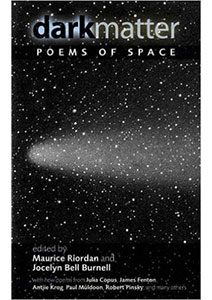Dark Matter: Poems of Space

Poets have long been stargazers, moved by the strange infinities of the universe to translate them into metaphor and song. But what do they know of the science of astronomy? And what do astronomers know of poetry?
For Dark Matter, the third in its trilogy of poetry and science anthologies, the Gulbenkian Foundation commissioned leading international poets to create new work inspired by their discussions with space scientists. The collaborations were brokered by poet Maurice Riordan and the eminent cosmologist Dame Jocelyn Bell Burnell (who as a post-graduate student was involved in the discovery of pulsars).
Dame Jocelyn has long harboured a passion for poetry. She says: ‘When I started “collecting” poetry with an astronomical theme some twenty years ago, I kept very quiet about my hobby. It is only in the last few years that I have dared to “come out” so it has been heartening that so many of my colleagues have been so willing to take part in this unusual exercise, as well as delightful to see the results of the collaborations.’
The poets have also responded to the challenge – and in characteristically diverse ways. Paul Muldoon offers a jaunty villanelle on Cleopatra’s asp and the expanding universe. John Kinsella reflects on the light echo of supernova 1987A, inspired by David Malin’s extraordinary photographs of the night sky. The South African writer Antjie Krog has recreated the symmetry of the HH212 gas jet, while Deryn Rees-Jones has transposed her poem into Morse code, which written down, she says, looks ‘like a depiction of a night sky busy with stars’.
‘Some have expressed scepticism about the possibility of any artist learning anything at all from a skimming visit to a boffin in a research facility,’ says Siân Ede, Director of the Arts Programme at the Gulbenkian. ‘I disagree. Poets are entitled to be snappers-up of unconsidered trifles, but they are no fools and who could not be intrigued by the profound implications of space science, its big bangs and phase transitions, its black holes and collapsed stars? These seem to be pertinent to our very existence and we must struggle with our grasp of them just as we might expect scientists to respect the profound historical knowledge and rigour required in writing good poetry.’
For the poets, initial bewilderment was soon replaced by a sense of awe and of recognition. ‘You sweep the skies looking for something that makes sense of the universe,’ says the poet Neil Rollinson, ‘and eventually you find it, or you find parts of it, or you find more questions, which seems to be what happens when you write poems. We’re in the same business. We’re just trying to find out what we are and what makes us tick. What the hell the universe is all about.’
The Wall Street Journal 9 May 2009
‘The Independent’ 21 April 2009.
‘Dark Matter’ listed as one of the ten best recent poetry books by Judith Palmer, Director of the Poetry Society
BBC Radio 4 ‘Start the Week’, 15 December 2008
Financial Times, 1 November 2008.
BBC Radio 3 ‘Nightwaves’, 27 October 2008
For further information and review copies contact: Louisa Hooper
Tel: 020 7908 7604, e-mail: [email protected]
Notes to Editors
- Dark Matter: Poems of space, edited by Maurice Riordan and Jocelyn Bell Burnell, is published by the Calouste Gulbenkian Foundation on 27 October 2008 as a paperback original, price: £8.50, 208pp, ISBN: 978 1 903080 10 8.
- Dark Matter includes new poems from Julia Copus, Greg Delanty, James Fenton, Leontia Flynn, John Kinsella, Antjie Krog, Nick Laird, Bill Manhire, Kathryn Maris, John McAuliffe, Jamie McKendrick, Paul Muldoon, Robert Pinsky, Deryn Rees-Jones, Neil Rollinson and Tom Sleigh.
- Maurice Riordan received the 2007 Michael Hartnett Award for his latest collection, The Holy Land (Faber), while previous collections, A Word from the Loki and Floods, were nominated for a TS Eliot Prize and a Whitbread Book Award. His other publications include A Quark for Mister Mark: 101 Poems About Science, the ecological anthology Wild Reckoning, and Hart Crane, which has recently appeared in Faber’s ‘Poet to Poet’ series. Born in Lisgold, Co Cork, he lives in London and edits Poetry London.
- Jocelyn Bell Burnell DBE is Visiting Professor of Astrophysics at the University of Oxford. As a post-graduate student at Cambridge, she was involved in the discovery of pulsars, for which her supervisor won a Nobel Prize. She has received numerous awards for her work, in the UK and USA, and is President of the Institute of Physics. She has long collected poems on astronomy and contributed to the OUP anthology, Contemporary Poetry and Contemporary Science, in 2006.
- Dark Matter is a companion volume to Wild Reckoning: An anthology provoked by Rachel Carson’s Silent Spring, edited by John Burnside and Maurice Riordan and published by the Calouste Gulbenkian in 2004, and Signs and Humours: The poetry of medicine, edited by Lavinia Greenlaw. When interviewed for the BBC Radio 4 programme Desert Island Discs the Government’s Chief Scientific Adviser Professor Sir David King chose Wild Reckoning as the book he would take with him to his desert island.
- The Calouste Gulbenkian Foundation is well known for its pioneering work in the field of art and science and its seminal publications in this area. Strange and Charmed: Science and the contemporary visual arts (2000) has inspired numerous adventurous research collaborations and residencies in both science and arts organisations. Science, not Art: Ten scientists’ diaries (2003) was BBC Radio 4 ‘Book of the Week’ in February 2004. The Foundation continues to explore the possibilities of cross-cultural dialogue between the arts and science and to facilitate a wider interest in and understanding of both.
